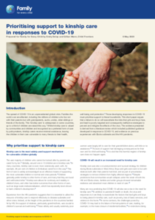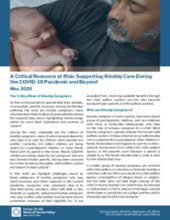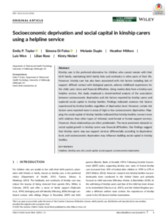Displaying 111 - 120 of 609
This study focused on kinship care as the top of the hierarchy of out-of-home care placements and utilized data obtained from a U.S. mid-Atlantic State Automated Child Welfare Information System. The study followed children who placed in out-of-home care over a three-year period.
This study systematically summarizes the effect of parenting interventions on kinship foster caregivers and their cared for children, and examines the intervention strategies and research methods used in order to provide a context in which to better understand effects of interventions.
With a recent interest by stakeholders in Ghana to consider kinship care as an alternative care option in child welfare policy, this study explores current kinship care challenges to help identify and address potential setbacks for policy and practice recommendations.
In this online event, Family for Every Child members FSCE (Ethiopia), The Mulberry Bush (UK), Praajak (India) and CSID (Bangladesh) discussed children's care in the context of COVID-19.
This study aims to describe the lived experiences of skip-generation families to better identify their needs.
This short paper from Family for Every Child argues that a failure to prioritize support for kinship care during the COVID-19 pandemic will exacerbate the risks that girls and boys face, and lead to poorly targeted and consequently ineffective strategies to prevent and mitigate the effects of the virus. The evidence presented is derived from a literature review which included published guidance developed in response to COVID-19, and evidence on previous experiences with Ebola outbreaks and the HIV pandemic.
This brief explores kinship care and how this critical resource is at risk now and in the future.
Using routine data from a kinship care helpline service, this study employed a mixed‐method analysis of the association between socioeconomic deprivation and risk factors reported by kinship carers in the UK and explored social capital in kinship families.
For this study, semi-structured interviews with twelve birth parents and twenty six permanent carers took place in New South Wales, Australia. Inductive thematic analysis was used to identify a pattern in the nature of adult relationships. The themes of 1) getting to know each other; 2) making family time; and 3) a shared future are presented.
There is little empirical evidence on how to improve the well‐being and safety of children in informal kinship care in Ghana. Thus, this study reports findings from in‐depth interviews with 15 young people, 18 to 23 years, from Banda—an ethnic group where informal kinship care is an accepted cultural practice.



